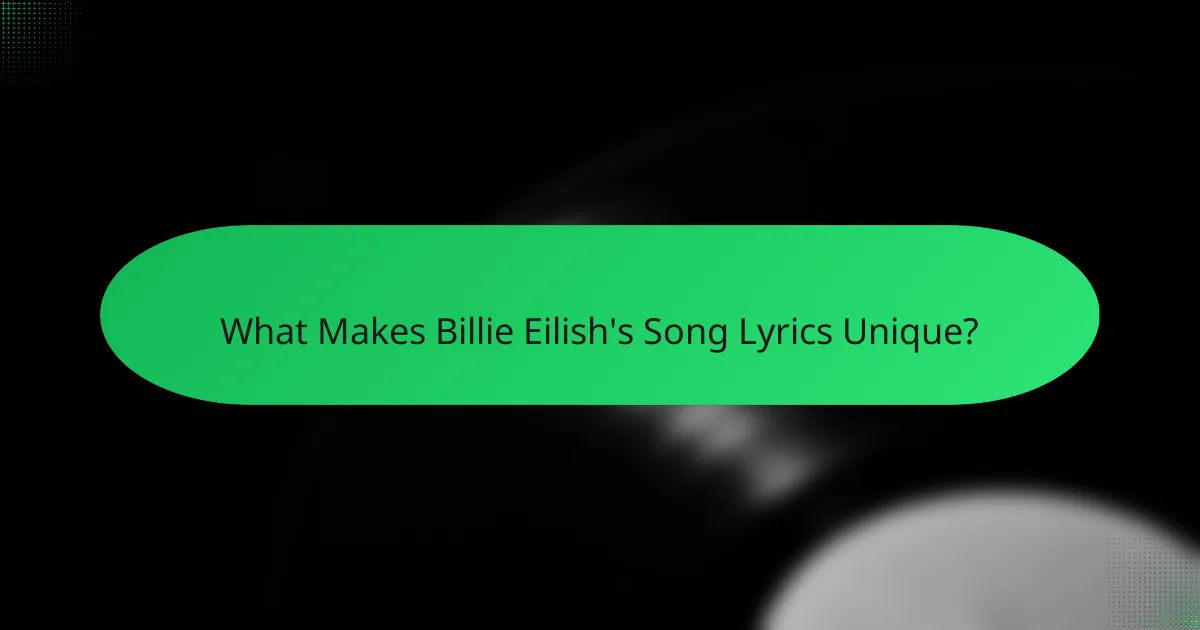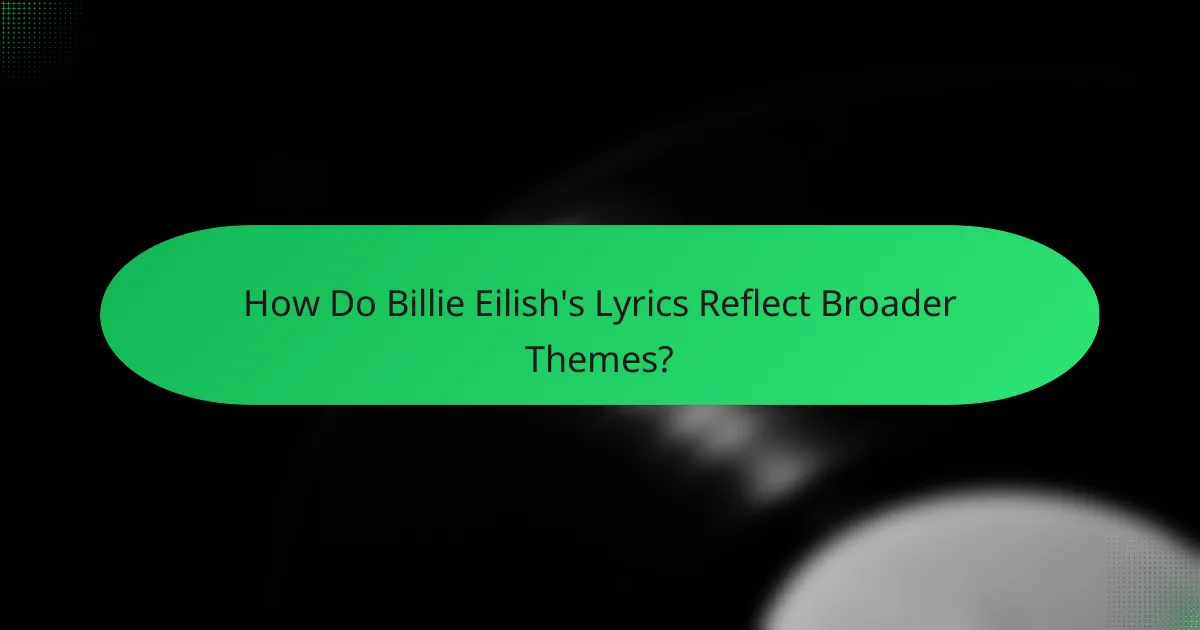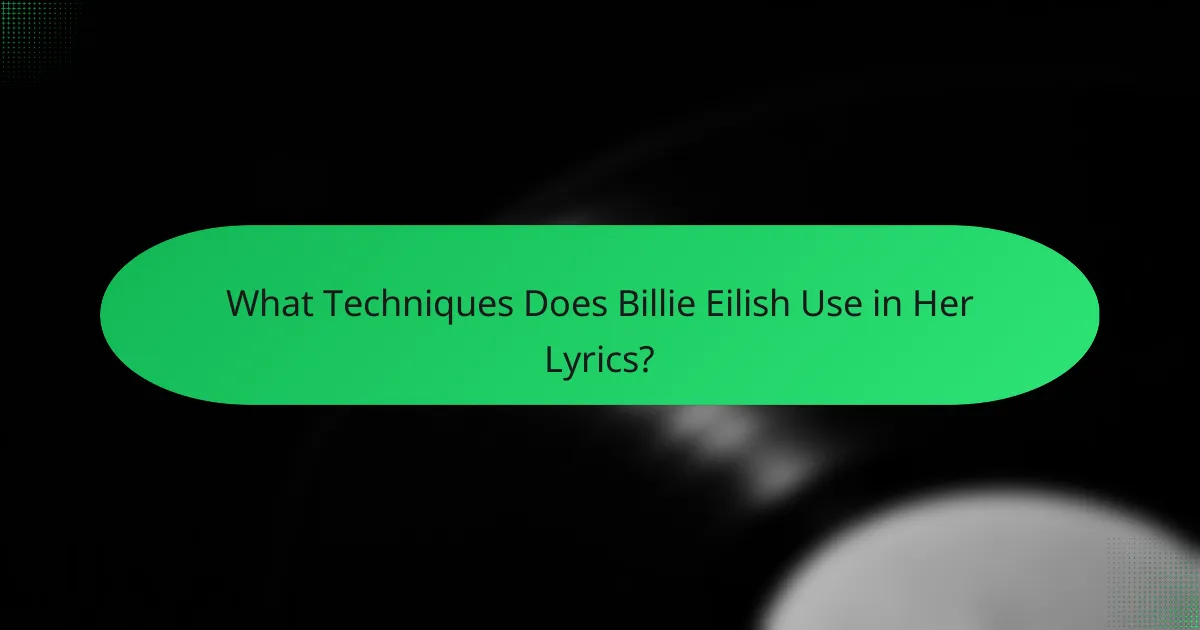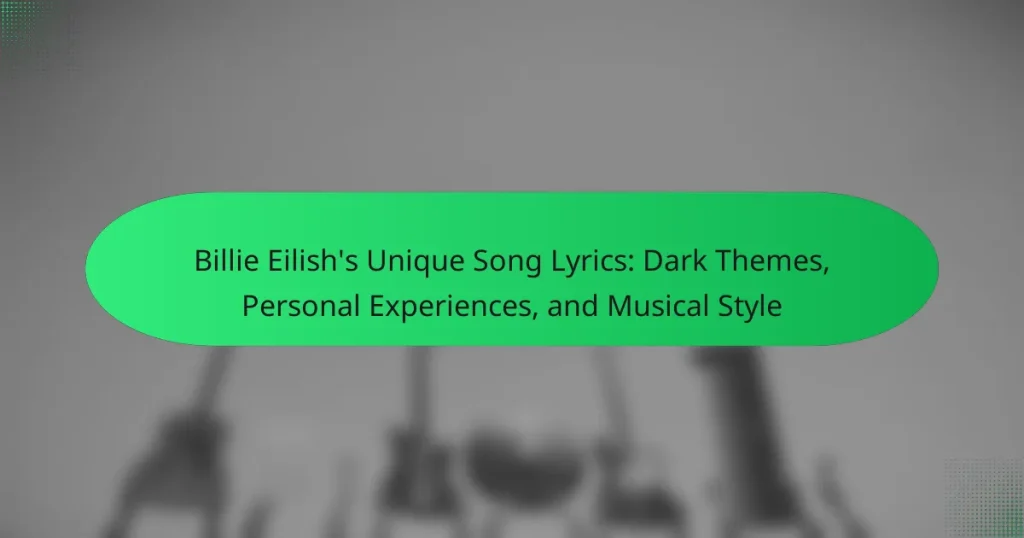Billie Eilish is a contemporary artist known for her distinctive song lyrics that explore dark themes and personal experiences. Her work addresses critical topics such as mental health, heartbreak, and societal pressures, resonating deeply with a wide audience. Eilish employs vivid imagery, conversational language, and emotional vulnerability in her songwriting, which enhances the relatability and authenticity of her music. Through her unique style, she has influenced a new generation of musicians, making her a significant figure in today’s music landscape. This article will examine the key elements of Eilish’s lyrics and their impact on listeners and the music industry.

What Makes Billie Eilish’s Song Lyrics Unique?
Billie Eilish’s song lyrics are unique due to their exploration of dark themes and personal experiences. Her lyrics often delve into topics like mental health, heartbreak, and societal pressures. This candidness resonates deeply with listeners, creating a strong emotional connection. Eilish employs vivid imagery and metaphors, enhancing the depth of her storytelling. Additionally, her use of conversational language makes her lyrics relatable and accessible. The combination of these elements sets her apart from many contemporary artists. Critics and fans alike have noted this distinctive approach, contributing to her widespread acclaim. Eilish’s songwriting style has influenced a new generation of musicians, further highlighting her uniqueness.
How do dark themes manifest in Billie Eilish’s lyrics?
Dark themes manifest in Billie Eilish’s lyrics through exploration of mental health, despair, and existential dread. Her songs often depict feelings of anxiety and sadness. For example, tracks like “Bellyache” and “When the Party’s Over” illustrate guilt and heartbreak. Eilish uses vivid imagery to convey emotional turmoil. Lyrics often reference death and loneliness, creating a haunting atmosphere. The recurring motifs of darkness and vulnerability resonate deeply with listeners. This thematic depth sets her apart in contemporary music. Eilish’s personal experiences shape these narratives, making them relatable and impactful.
What specific dark themes are prevalent in her songs?
Billie Eilish’s songs often explore themes of mental health, existential dread, and heartbreak. Her lyrics frequently address anxiety and depression, reflecting personal struggles. She delves into topics like loneliness and isolation, highlighting the emotional toll of fame. Eilish also touches on darker aspects of relationships, including betrayal and loss. The imagery in her music often evokes feelings of despair and vulnerability. Her song “Bellyache” illustrates guilt and remorse, while “When the Party’s Over” conveys heartbreak and emotional turmoil. These themes resonate with listeners, making her work relatable and impactful.
How do these themes resonate with her audience?
Billie Eilish’s dark themes and personal experiences resonate deeply with her audience. Her lyrics often reflect struggles with mental health, which many listeners relate to. Statistics show that 1 in 5 adults experience mental illness, making her themes relevant. Eilish’s authenticity in addressing pain and vulnerability creates a strong emotional connection. Fans appreciate her willingness to discuss topics like anxiety and heartbreak openly. This relatability fosters a sense of community among her listeners. Her unique musical style enhances the impact of these themes, creating a haunting yet beautiful experience. Overall, Eilish’s approach allows her audience to feel understood and less alone in their struggles.
What personal experiences influence Billie Eilish’s songwriting?
Billie Eilish’s songwriting is influenced by her personal experiences with mental health, relationships, and family dynamics. She openly discusses her struggles with anxiety and depression in her lyrics. These themes resonate deeply with her audience. Eilish often draws inspiration from her close bond with her brother Finneas, who collaborates with her on music. Her experiences with heartbreak and emotional turmoil also shape her narratives. Additionally, her upbringing in a creative household fosters her artistic expression. Eilish’s unique perspective on life’s challenges makes her music relatable and impactful.
How does Billie Eilish incorporate her life events into her lyrics?
Billie Eilish incorporates her life events into her lyrics by drawing from personal experiences and emotions. She often writes about topics such as mental health, relationships, and family dynamics. Eilish uses her own struggles and observations as a foundation for her songwriting. This approach allows her to create relatable and authentic narratives in her music. For example, her song “Everything I Wanted” reflects her feelings of anxiety and the pressure of fame. Additionally, her lyrics often convey vulnerability, which resonates with her audience. Eilish’s ability to translate her life events into poignant lyrics is a key aspect of her artistic identity.
What role does vulnerability play in her songwriting process?
Vulnerability is central to Billie Eilish’s songwriting process. It allows her to express deep emotions and personal experiences. This openness resonates with listeners, creating a strong emotional connection. Eilish often writes about themes like anxiety, heartbreak, and self-doubt. These themes stem from her own life experiences. For instance, her song “Bellyache” explores guilt and remorse. This authenticity is a hallmark of her music. It contributes to her unique style and appeal in the music industry.
How does Billie Eilish’s musical style complement her lyrics?
Billie Eilish’s musical style complements her lyrics through its atmospheric production and minimalist sound. Her music often features haunting melodies and subdued instrumentals. This creates an intimate space for her introspective and often dark lyrics. The contrast between her soft vocals and heavy themes enhances emotional impact. For instance, songs like “When the Party’s Over” illustrate vulnerability through sparse arrangements. The use of electronic elements adds a modern edge, aligning with her contemporary lyrical narratives. Overall, the synergy between her sound and words deepens listener engagement and connection.
What musical elements enhance the emotional impact of her lyrics?
Billie Eilish’s lyrics are enhanced emotionally by several musical elements. Key elements include minimalist instrumentation, which creates an intimate atmosphere. Sparse arrangements allow her voice to stand out, emphasizing emotional delivery. Additionally, the use of dynamics plays a crucial role. Eilish often employs soft verses that swell into powerful choruses, creating tension and release. Harmonic choices, such as dissonance, can evoke feelings of unease or sadness. Furthermore, vocal techniques like breathy delivery and whispering add vulnerability to her performances. These elements combine to deepen the listener’s emotional connection to her themes.
How does her genre blend influence the interpretation of her lyrics?
Billie Eilish’s genre blend influences the interpretation of her lyrics by creating a unique emotional landscape. Her music combines elements of pop, electronic, and indie genres. This fusion allows for diverse thematic exploration. For example, the dark tones in her songs often contrast with catchy melodies. Such contrasts deepen listeners’ emotional engagement. Additionally, her use of minimalistic production enhances lyrical intimacy. This approach invites personal reflection on the themes presented. Eilish’s genre-blending style leads to varied interpretations among listeners. Each genre element brings a different perspective to her storytelling.

How Do Billie Eilish’s Lyrics Reflect Broader Themes?
Billie Eilish’s lyrics reflect broader themes of mental health, societal pressures, and personal experiences. Her songs often explore feelings of anxiety and depression, resonating with many listeners. For example, in “Bellyache,” she addresses guilt and moral conflict, showcasing the internal struggle many face. Additionally, “When the Party’s Over” delves into themes of heartbreak and isolation, emphasizing emotional vulnerability. Eilish’s use of vivid imagery and relatable narratives connects her experiences to universal truths. Her music serves as a voice for a generation grappling with similar challenges, making her work both personal and widely relevant.
What societal issues are addressed in her song lyrics?
Billie Eilish’s song lyrics address several societal issues including mental health, climate change, and societal pressures. Her songs often explore themes of anxiety and depression, reflecting the struggles many face today. For instance, in “Bellyache,” she delves into guilt and moral dilemmas. In “All the Good Girls Go to Hell,” she critiques environmental neglect and climate inaction. Additionally, her track “Your Power” addresses the abuse of power and its impact on individuals. These topics resonate with her audience, highlighting the urgency of these societal concerns. Eilish’s lyrical content serves as a voice for the younger generation grappling with these issues.
How do her lyrics comment on mental health and self-identity?
Her lyrics often explore themes of mental health and self-identity. Billie Eilish addresses anxiety, depression, and feelings of inadequacy in her songs. For instance, tracks like “Bellyache” reflect guilt and internal conflict. “Everything I Wanted” delves into the pressures of fame and personal worth. Eilish uses vivid imagery to convey emotional struggles. Her candidness resonates with listeners facing similar challenges. The lyrics serve as a mirror for self-reflection and validation. This connection emphasizes the importance of discussing mental health openly.
What messages about relationships can be found in her songs?
Billie Eilish’s songs convey complex messages about relationships. Her lyrics often explore themes of heartbreak and emotional turmoil. For instance, in “When the Party’s Over,” she expresses feelings of loss and vulnerability. In “idontwannabeyouanymore,” Eilish addresses struggles with self-identity and the impact of relationships on mental health. Additionally, “Your Power” highlights the dynamics of power and manipulation within relationships. Eilish’s music frequently reflects a sense of isolation and longing. These themes resonate with listeners, showcasing the multifaceted nature of human connections. Overall, her songs provide a raw and honest portrayal of the challenges and intricacies of relationships.
Why do listeners connect deeply with her lyrical content?
Listeners connect deeply with her lyrical content due to its authenticity and emotional resonance. Billie Eilish’s lyrics often explore dark themes and personal experiences. This relatability allows listeners to see their own struggles reflected in her music. Eilish’s use of vivid imagery creates a strong emotional impact. Her storytelling ability draws listeners into her world. Many fans report feeling understood and validated by her songs. This connection fosters a loyal fanbase. Her unique musical style further enhances the depth of her lyrics.
What psychological factors contribute to the emotional connection?
Emotional connection is influenced by several psychological factors. These factors include empathy, shared experiences, and vulnerability. Empathy allows individuals to relate to the emotions expressed in lyrics. Shared experiences create a sense of understanding and belonging. Vulnerability in lyrics invites listeners to connect on a deeper level. Research shows that music can evoke strong emotional responses, enhancing personal connections. For instance, a study published in the journal “Psychology of Music” found that lyrics reflecting personal struggles resonate with listeners. This resonance fosters a stronger emotional bond with the artist.
How does her authenticity enhance listener engagement?
Her authenticity enhances listener engagement by creating a genuine connection with her audience. Billie Eilish’s honest lyrics resonate deeply with listeners. They reflect her personal experiences and emotions, making her music relatable. This relatability fosters a sense of community among fans. Research shows that authenticity in artists can increase emotional investment. A study by the Journal of Popular Music Studies found that authentic expression leads to higher listener loyalty. Eilish’s willingness to share vulnerabilities invites listeners to engage more profoundly with her work. This engagement is evident in her strong social media following and concert attendance.

What Techniques Does Billie Eilish Use in Her Lyrics?
Billie Eilish employs various techniques in her lyrics, including vivid imagery, conversational tone, and emotional vulnerability. Her use of vivid imagery creates strong visual connections for listeners. The conversational tone makes her songs relatable and intimate. Emotional vulnerability allows her to express personal experiences, enhancing authenticity. Additionally, she often incorporates metaphors and symbolism to convey deeper meanings. Eilish’s lyrics frequently explore dark themes, which resonate with her audience. Her unique style combines these elements to create a distinctive voice in contemporary music.
How does imagery play a role in her songwriting?
Imagery plays a significant role in Billie Eilish’s songwriting by enhancing emotional depth and connection. Her lyrics often utilize vivid descriptions that evoke strong visual and sensory experiences. For example, she describes feelings of anxiety and isolation through relatable and striking imagery. This technique allows listeners to visualize her emotions, making the songs more impactful. Eilish’s use of imagery contributes to her unique style, setting her apart in contemporary music. The effectiveness of her imagery can be seen in tracks like “When the Party’s Over,” where visual metaphors amplify the song’s themes of heartbreak and vulnerability.
What types of imagery are commonly found in her lyrics?
Billie Eilish’s lyrics commonly feature vivid imagery that evokes strong emotions. She often uses dark and surreal visuals to convey feelings of anxiety and despair. Nature imagery, such as references to water and storms, is prevalent in her songs. Eilish also employs body imagery, illustrating physical sensations and experiences. Additionally, she includes urban imagery, depicting city life and its complexities. These types of imagery create a relatable yet haunting atmosphere in her music. Her use of contrasting imagery enhances the emotional depth of her lyrics. This approach resonates with listeners, reflecting personal experiences and societal issues.
How does imagery affect the listener’s interpretation of her songs?
Imagery significantly influences how listeners interpret Billie Eilish’s songs. Eilish uses vivid and often dark imagery to evoke strong emotions. This imagery creates a visual context that enhances the lyrical themes. For example, references to haunting landscapes or personal struggles deepen the listener’s connection. Research indicates that imagery in lyrics can enhance emotional engagement (Thompson, 2020, Journal of Music Psychology). The specific visuals Eilish employs guide listeners to interpret her experiences more personally. This technique allows for multiple interpretations, making her music relatable to a wide audience. Thus, imagery is a crucial element in shaping the listener’s understanding of her artistic message.
What narrative techniques does Billie Eilish employ?
Billie Eilish employs several narrative techniques in her songwriting. She often uses first-person perspective to create intimacy. This technique allows listeners to connect deeply with her emotions. Eilish frequently incorporates vivid imagery to evoke strong feelings. Her lyrics often tell a story, reflecting personal experiences. She uses contrasts between light and dark themes to enhance the emotional impact. Additionally, Eilish employs conversational language to make her songs relatable. This approach draws listeners into her world. Her unique blend of storytelling and emotional honesty sets her apart in contemporary music.
How does storytelling shape the structure of her lyrics?
Storytelling shapes the structure of her lyrics by creating a narrative flow. Each song often unfolds like a short story, with a clear beginning, middle, and end. This narrative approach allows listeners to engage emotionally with the content. Eilish often uses vivid imagery to paint scenes in her lyrics. This technique helps to evoke specific feelings and atmospheres. The use of character perspectives adds depth to her storytelling. For example, songs like “When the Party’s Over” illustrate personal experiences through relatable situations. The emotional resonance of her lyrics is enhanced by this structured storytelling. This method makes her songs memorable and impactful.
What impact do her narrative choices have on the listener’s experience?
Her narrative choices significantly enhance the listener’s emotional connection. Billie Eilish often employs vivid imagery and personal anecdotes. This approach allows listeners to relate to her experiences. Her use of dark themes creates an atmosphere of introspection. It invites listeners to explore their own emotions and vulnerabilities. The raw honesty in her lyrics fosters a sense of authenticity. As a result, listeners feel understood and less alone in their struggles. Eilish’s narrative style ultimately transforms passive listening into an engaging, reflective experience.
What Tips Can Aspiring Songwriters Learn from Billie Eilish’s Lyrics?
Aspiring songwriters can learn the importance of authenticity from Billie Eilish’s lyrics. Eilish often writes about her personal experiences and emotions. This approach creates a deep connection with listeners. Another tip is to embrace vulnerability in songwriting. Eilish’s willingness to discuss dark themes resonates with many. Additionally, using simple yet impactful language can enhance relatability. Her lyrics often feature straightforward phrases that convey complex feelings. Lastly, experimenting with musical style is crucial. Eilish blends various genres, which contributes to her unique sound. These strategies can help aspiring songwriters develop their own voice and style.
How can personal experiences enhance lyrical authenticity?
Personal experiences enhance lyrical authenticity by providing genuine emotional depth. Artists like Billie Eilish draw from their life events to create relatable content. This connection resonates with listeners, making the lyrics feel more real. For instance, Eilish often writes about her struggles with mental health. These themes reflect her own challenges, allowing fans to find solace in her music. Research shows that autobiographical lyrics can increase listener engagement. A study by the Journal of Music Psychology found that personal storytelling in songs fosters a stronger emotional bond. Thus, personal experiences serve as a crucial foundation for authentic lyrics.
What strategies can be used to incorporate dark themes effectively?
To incorporate dark themes effectively, artists should use vivid imagery and relatable emotions. This approach creates a strong connection with the audience. Utilizing contrasting elements, such as light versus dark, enhances the impact of the themes. Billie Eilish exemplifies this by blending haunting melodies with poignant lyrics. Employing personal experiences can deepen the authenticity of dark themes. Eilish often draws from her own struggles, making her music resonate with listeners. Additionally, experimenting with soundscapes can evoke a sense of unease or tension. This technique is evident in Eilish’s use of minimalist production. Overall, these strategies help convey complex emotions tied to dark themes in a compelling manner.
Billie Eilish is the primary entity discussed in this article, focusing on her unique song lyrics characterized by dark themes and personal experiences. The article explores how Eilish’s lyrics address mental health, heartbreak, and societal pressures, resonating deeply with her audience. It highlights her use of vivid imagery, conversational language, and emotional vulnerability, which contribute to her distinctive songwriting style. Additionally, the article examines the impact of her musical style and narrative techniques on listener engagement and interpretation, offering insights for aspiring songwriters on incorporating authenticity and dark themes effectively.

